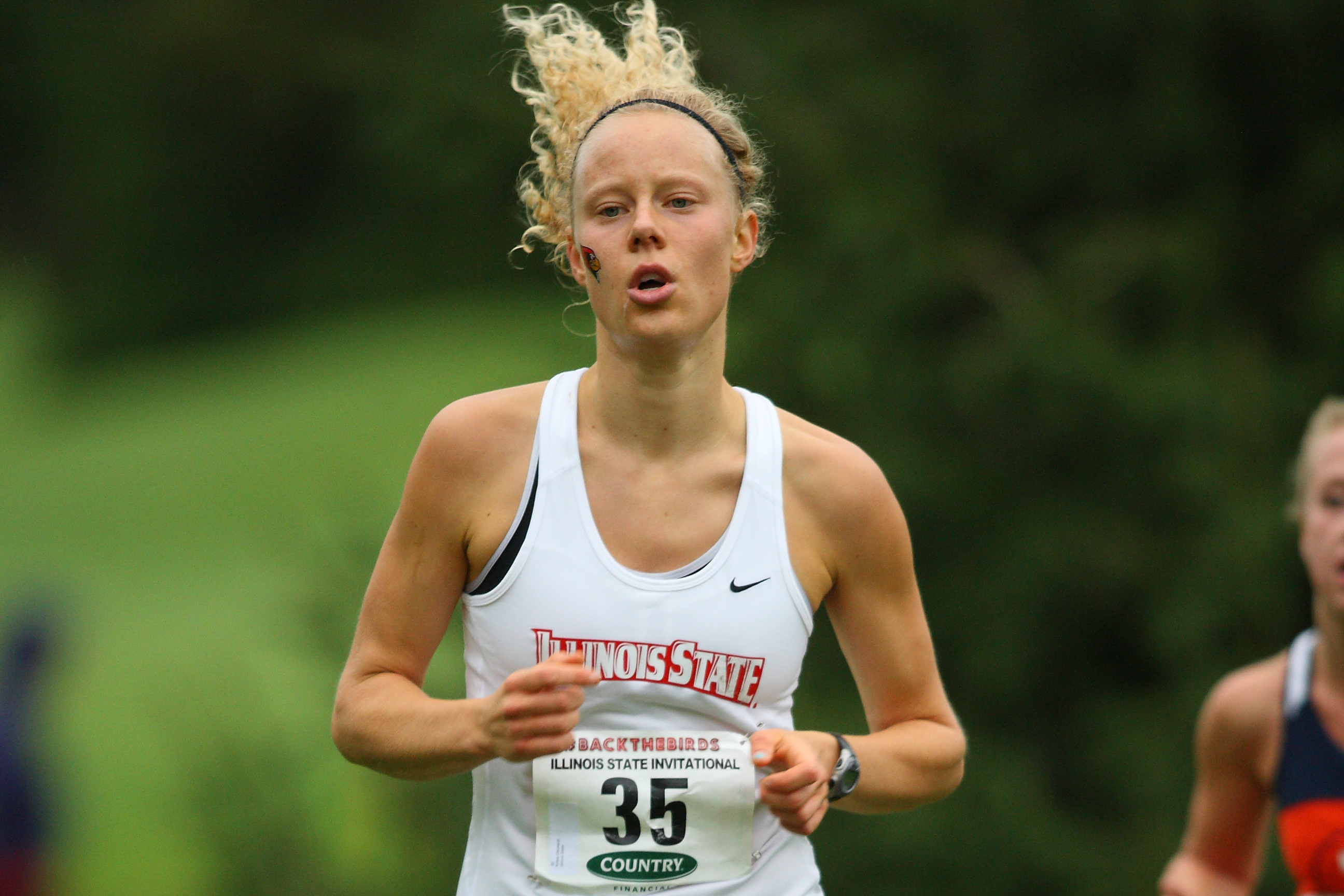On paper, Krista DeCeault’s freshman year as a Redbird runner was tremendous. She led Illinois State to its first conference championship in years, and she came in first place almost every race she ran in.
Privately, it was her darkest hour. DeCeault was losing her battle with anorexia, which began while she was in high school. Her body—even her heart—was getting weaker, and her physical struggles evolved into depression, anxiety, and social isolation. With help from her coaches and her parents, she left Illinois State in 2011 and returned home to Virginia, where she was hospitalized.
“It was like a black hole,” DeCeault said. “By the time I realized I had anorexia, it was almost like I couldn’t pull myself back out of it.”
“It was like a black hole.”—Krista DeCeault
Four years later, DeCeault is back on track and back at Illinois State. Powered by the same drive that made her a top recruit for the Redbird track and field team, DeCeault’s recovery has been stunning.
Not only did she return to Illinois State and rejoin her team, but she recently completed her first marathon and qualified for the Boston Marathon in 2017. She’s now a graduate student in Illinois State’s dietetics internship program, with future goals of helping young runners understand the warning signs and risks of an eating disorder before it’s too late.
“You can’t help other people until you help yourself,” DeCeault said.
DeCeault has been an athlete all her life, and she’s always been interested in nutrition and how food affects her performance. This passion took a darker turn late in high school, when she started to compare her own physique to the runners who were beating her. They were thinner.

DeCeault’s recovery is apparent in these two photos of her running for Illinois State, in fall 2011 (left) and again in fall 2014 (right).
Later, DeCeault would learn that many of those girls were battling eating disorders too. Back then, she didn’t realize the actions she was taking put her at risk for anorexia.
“It’s easy to fall into,” she said. “I had such an intense fear of food. I wasn’t aware of the signs or symptoms.”
She was the No. 1 runner for the Redbirds her freshman year, but it took a huge toll. She didn’t have a very good life balance, which negatively impacted her health, academics, and social life.
“Over the course of a few months, she started to crumble apart. That was difficult to watch,” said Jeff Bovee, the coach who recruited her, now director of track and field and head cross country coach. “We had a very close eye on her. As a staff, as a department, we saw that she needed more help.”
DeCeault didn’t finish the season. Her mother drove from Virginia to pick her up and take her home. After her hospitalization, she regrouped and began taking classes at a community college in Virginia.
Her recovery wasn’t quick, and it wasn’t easy. Her friends, her coaches, and her family all helped her through it. Eventually, she decided she wanted to return to Illinois State—and to her team.
“I didn’t want to give up my passion for running,” she said.
Going the distance
DeCeault finished her undergraduate degree at ISU in food, nutrition and dietetics in May 2015. After finishing her running career at ISU last spring, DeCeault began training for marathons. She ran the Chicago Marathon in October, trouncing her own goal by running a time of 3 hours, 21 minutes, qualifying for Boston.
“I’d never run the full distance before, so I didn’t really know what to expect,” she said.
Mostly, she’s focused on her graduate work. She hopes to use her dietetics training to debunk myths and raise awareness among female runners who are more vulnerable to developing eating disorders. In a study of Division 1 NCAA athletes, over one-third of female athletes reported attitudes and symptoms placing them at risk for anorexia nervosa, according to the National Eating Disorders Association.
“If a dietician would’ve come to my high school and talked to the cross-country team when I was a freshman, I probably wouldn’t have developed an eating disorder because I would’ve known the warning signs,” she said.
DeCeault is a peer facilitator for ISU’s Body Project, a body acceptance program sponsored by Student Counseling Services and Health Promotion and Wellness that explores the cultural pressures that women face to conform to the ideal-thin standard. She’s also conducting research on this program for her graduate thesis.
DeCeault praised her coaches and Family and Consumer Sciences professors for their support throughout her battle with anorexia and through her recovery journey. Bovee’s support was crucial, she said.
“Krista has that intrinsic love of running. It’s great to see her so happy and loving life and doing the things she truly has a passion for, like running marathons,” Bovee said. “I can’t tell you how proud I am.”
Ryan Denham can be reached at rmdenha@IllinoisState.edu.


Please read “The Fifth Floor” by Julie Oleszek. It tells a true story of a child dealing with these issues. Michele Blubaugh